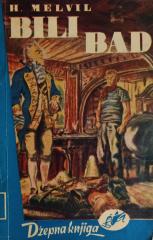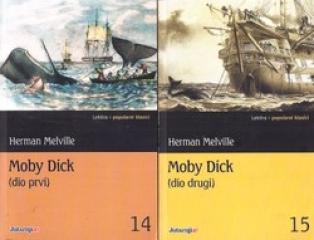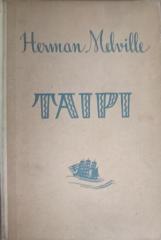Herman Melville
Američki književnik (New York, 1. VIII. 1819 – New York, 28. IX. 1891). Zbog financijske propasti obitelji morao prekinuti redovito školovanje. Kao mali od palube otplovio je (1839) preko Atlantika za Liverpool; bio je (1841) član posade kitolovca koji je plovio južnim Pacifikom. Utekao je s broda na jednome od Marquiških otoka i boravio s polinezijskim plemenom; potom se našao na Tahitiju i Havajima, odakle se vratio kući 1844. kao mornar na ratnoj fregati. Svoje pomorske doživljaje opisao je u nekoliko knjiga – Taipi (Typee, 1846), Omoo (1847), Mardi (1849), Redburn (1849) i Mornar u bijelom haljetku (White-Jacket, 1850), od kojih su osobito prve dvije postigle velik uspjeh.
U sljedećem romanu, Moby Dick ili Bijeli kit (Moby-Dick, or The Whale, 1851), koji se danas smatra jednim od vrhunaca američke književnosti, Melville produbljuje svoj umjetnički postupak, no djelo je prošlo gotovo nezapaženo kod suvremenika. Epski koncipiran roman o traganju kapetana Ahaba za golemim bijelim kitom zbog kojeg je izgubio nogu, kulminira u sukobu između kitolovca Pequoda i kita, u kojem pogiba Ahab sa cijelom posadom osim pripovjedača, mornara Ishmaela. Djelo je simbolička vizija vječnoga sukoba između čovjeka i Boga, između ufanja i sumnje, slika sprege dobra i zla, nerazrješive tajne zbilje i privida, te osjetilnoga svijeta i njegova metafizičkoga smisla.
Melvilleova nadahnuta proza u duhu je Shakespearea, Biblije i engleskih baroknih pjesnika. U sljedećem djelu Pierre (1852), odstupivši od žanra pustolovno-metafizičkog romana, spaja svoju trajnu zaokupljenost konvencijama obiteljskoga i sentimentalnoga romana. Nakon pustolovnoga povijesnog romana Israel Potter (1855) objavio je zbirku pripovijesti Priče s verande (The Piazza Tales, 1856), od kojih se ističu Benito Cereno i Pisar Bartleby (Bartleby the Scrivener), u kojima dotiče goruće teme onodobne Amerike (ropstvo, nasilje, otuđenje, komercijalizaciju) te anticipira moderno društvo koje negira pojedinca i njegovu slobodu. Roman Sljepar (The Confidence-Man, 1857), satirička alegorija o položaju suvremenog čovjeka, smješten je u okvir riječnoga putovanja po američkome Zapadu.
Zahtjevni oblici njegove proze i sve pesimističnija vizija udaljile su Melvillea od šire čitateljske publike; njegova karijera tonula je u zaborav, a nepovoljne obiteljske okolnosti i psihološke krize obilježile su njegove kasnije godine. God. 1876. objavio je opsežnu filozofsko-religioznu poemu Clarel, djelomično utemeljenu na prijašnjem putovanju po Europi i Svetoj zemlji. Njegove pjesme, posebno one nadahnute Američkim građanskim ratom (Opisi bitaka i vidova rata – Battle-Pieces and Aspects of the War, 1866), naknadno su prevrjednovane i danas čine važan dio američkoga pjesništva XIX. st.
U nemogućnosti da živi od pisanja, Melville je konačno dobio državnu službu carinskoga nadzornika, a književnim se radom nastavio baviti daleko od očiju javnosti. Posljednje mu je prozno djelo pripovijest Billy Budd (1888., obj. 1924), o sukobu etičkih normi u tragičnim okolnostima. Tek oko 1920-ih kritika je započela revalorizirati Melvilleov opus da bi ga oko 1940-ih kanonizirala kao pisca koji je u XIX. st. kritički pronicao u moralne i društvene implikacije američkoga života te razgranatim simbolizmom izrazio duhovnu problematiku koja je svoj vrhunac, uz možda iznimku Dostojevskoga, doživjela tek s piscima dva-tri naraštaja nakon njegova.
Titles in our offer
Moby Dick
Moby Dick je roman američkog pisca Hermana Melvillea iz 1851. godine. Knjiga je pripovijest mornara Ishmaela o manijakalnoj potrazi Ahaba, kapetana broda Pequod, za osvetom Moby Dicku, golemom bijelom kitu koji mu je na prošlom putovanju odgrizao nogu.
Taipi
Beschreibung eines viermonatigen Aufenthalts bei den Eingeborenen in einem Tal auf den Marquesas-Inseln.


